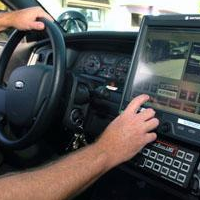L.A. Law Enforcement Sued over License Plate Scanners that Profile Drivers in a Database

Los Angeles-area law enforcement agencies, which have photographed and scanned 180 million license plate images into a database, say the information is innocuous, and only car thieves and other bad characters have anything to fear from it.
But they would still rather not share the information they collect with the public, and denied the American Civil Liberties Union (ACLU) and the Electronic Frontier Foundation (EFF) their request to take a peek at one week’s worth of data.
So eight months after making the request under the California Public Records Act, the ACLU and EFF sued the Los Angeles Police Department and the L.A. County Sheriff’s Department Monday to get the information. They are concerned that law-abiding people are having their movements tracked and stored without their permission for data mining purposes that have yet to be imagined.
The database can hold license plate numbers, a photo and the time, date and GPS location of the vehicle and its occupants.
ACLU attorney Peter Bibring told the Associated Press they were trying to determine precisely how many plates were being scanned and whether the databases were skewed toward collecting information on minorities. There are presently no specific guidelines on how the information is used, who it is shared with and how long it is kept on file. Bibring said the ACLU ultimately wants data collected on cars and drivers who are not involved in a crime to be quickly erased.
Both departments maintain that the data sought by the advocacy groups is investigative material and can’t be shared.
Automatic license plate readers (ALPRs), mounted on police cars and telephone poles, can record up to 14,000 plates in one shift, according to the EFF. The surveillance system is a joint public-private endeavor and 71% of law enforcement agencies across the country have signed up to participate, according to a 2012 report (pdf) by the Police Executive Research Forum.
Vigilant Video, and its National Vehicle Location Service, has more than half a billion license-plate records on file, according to a story published by California Watch. A single patrol car can photograph thousands of vehicles in a single shift. Around 1,200 new law-enforcement users a month reportedly sign up to access the system, which is offered free by Vigilant, even to those agencies that neither buy their scanner nor contribute to the database.
Around 28 jurisdictions in Los Angeles County use plate readers. LAPD has 120 cars equipped with cameras and the sheriff’s department has 77.
–Ken Broder
To Learn More:
Groups Want Details on License Plate Readers (by Tami Abdollah, Associated Press)
Privacy Groups File Lawsuit over License Plate Scanners (by Joel Rubin and Richard Winton, Los Angeles Times)
EFF and ACLU Sue LA Law-Enforcement Agencies over License-Plate Reader Records (Electronic Frontier Foundation)
Automated License Plate Readers Threaten Our Privacy (by Jennifer Lynch and Peter Bibring, Electronic Frontier Foundation)
ACLU-SD and EFF v. LAPD and LASD (Los Angeles County Superior Court)
Police, Lobbyists Defeat Bill to Limit License-Plate Scanners (by G.W. Schultz, California Watch)
Police Use License Plate Scanners to Profile Drivers in Private Database (by Ken Broder, AllGov California)
- Top Stories
- Controversies
- Where is the Money Going?
- California and the Nation
- Appointments and Resignations
- Unusual News
- Latest News
- California Forbids U.S. Immigration Agents from Pretending to be Police
- California Lawmakers Urged to Strip “Self-Dealing” Tax Board of Its Duties
- Big Oil’s Grip on California
- Santa Cruz Police See Homeland Security Betrayal in Use of Gang Roundup as Cover for Immigration Raid
- Oil Companies Face Deadline to Stop Polluting California Groundwater





